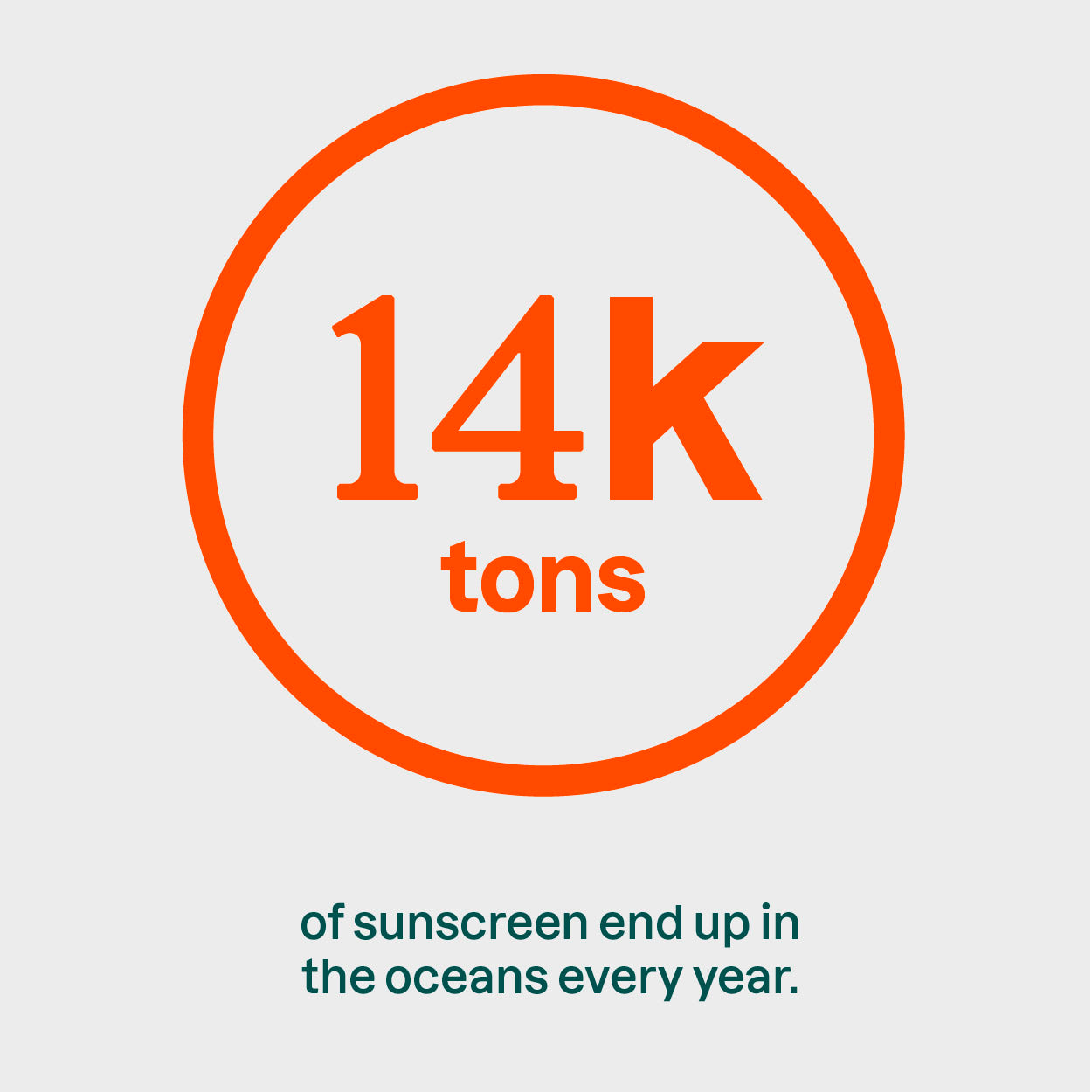3 reasons to choose a plastic-free sunscreen
With summer fast approaching, no doubt you’ll be hunting high and low for the perfect sunscreen: One that’s not too greasy, with an SPF of at least 30 and a formula that spreads nicely without leaving a white cast. We’d like to add an important recommendation to your list: eco-friendly packaging!
Choosing a plastic-free sunscreen can be just as good for you as for the planet. Here are three good reasons why.
1. Protect the earth
The beauty industry produces approximately 120 billion units of plastic annually, the vast majority of which, unfortunately, is not recyclable1. Yup, even if you carefully place all your tubes and bottles in the recycling bin, only 9% of all plastic waste is recycled globally2.
The question then becomes, “where do these items end up?” About 12% is incinerated, meaning carbon dioxide and methane is released into the earth’s atmosphere and thereby exacerbates climate change, while almost all the rest ends up in landfills where it takes up to 500 years to disintegrate, without ever completely decomposing.
By using eco-innovative beauty products, like plastic-free sunscreen, you help reduce this monstrous accumulation of plastic that is intoxicating our planet.

2. Protect marine life… and your life as well!
There are times when plastic is not recycled, landfilled, or incinerated: Rather, it is dumped into the ocean. Every year, more than 14 million tons of plastic gets dumped into our vast expanses of salt water3, dangerously threatening marine life… as well as human life.
Due to UV rays, wind, ocean currents and other environmental factors, plastic ultimately disintegrates into particles that are called microplastics or nanoplastics. These tiny particles are constantly (and accidentally) ingested by marine animals as well as humans and may contain traces of carcinogens and endocrine disruptors (which are used to produce plastic). They have been found in beer, salt and running water4.

And it's not just the containers that can pollute our oceans: The content of these products also plays an important role! According to the Coral Reef Alliance, more than 14,000 tons of sunscreen end up in oceans every year5.
Coming directly from swimmers or wastewater, these residues contain ingredients like oxybenzone, octinoxate and benzophenone-2 that are genuinely toxic – even in minute quantities – to several marine species, including corals. The solution? Choose a plastic-free, reef-safe sunscreen with zinc oxide!
What ingredients should be avoided in sunscreen?
Oxybenzone, octinoxate and benzophenone-2 are to be avoided. These chemicals that are used as sunscreens cause incredible damage in coral colonies: They accelerate bleaching, damage DNA, affect skeleton growth, cause significant deformities, or even kill young coral6.
Using reef-safe sunscreen with zinc oxide ensures there is no trace of these harmful ingredients in the water.
3. Protect your skin
Obviously, the main objective when shopping for sunscreen is to protect yourself from the sun's rays, which are responsible for 90% of the visible signs of aging7 and, worse still, about 65% of melanoma cases in Canada8.
The good news is, as you browse through the plastic-free sunscreen choices that are available, you’ll notice that brands that care about the health of the planet tend to care about your health, too. Eco-innovative skincare options include zinc oxide sunscreens, which according to EWG is the safest mineral sunscreen and is as good for you as it is for the environment.

Instead of penetrating the skin, non-nano zinc oxide forms a protective barrier that blocks UVA and UVB rays before they come into contact with your body, providing highly effective broad-spectrum protection. Learn more about this naturally derived sunscreen here.
Which plastic-free sunscreen should you choose?
So are there eco-friendly sunscreens that are also effective and healthy? Absolutely! ATTITUDE ticks all the boxes: Plastic-free and reef-safe sunscreens that are formulated with naturally sourced ingredients such as non-nano zinc oxide. These uniquely textured sunscreen sticks protect and hydrate without leaving a white, oily (and annoying!) residue on your skin. Here are some of our favorites, all offered in FSC-certified biodegradable cardboard tubes.
Plastic Free Mineral Sunscreen Stick SPF 30
With its sweet orange blossom aroma and convenient size, this non-nano sunscreen containing zinc oxide will be your BFF all summer.

Mineral face sunscreen stick SPF 30
No aroma. No plastic. No problem! Formulated with coconut oil and shea butter, this sunscreen stick is like a face moisturizer with zinc oxide as a bonus. In addition to being suitable for all skin types, it is ultra-easy to apply to your face and can be brought everywhere, from the neighborhood swimming pool to tropical beaches.

Tinted sunscreens with zinc oxide
Need a little extra radiance? Mineral sunscreen sticks for body and faceprotect against UVA and UVB rays in addition to enhancing your natural glow.

Lip Balm SPF 15
Avoid having dry lips ruin those beautiful sunny days by always carrying your plastic-free lip balm with you. Enriched with superbly nourishing ingredients like shea butter and coconut, argan and castor oils, and infused with a delicate coconut aroma, it is sure to put a smile on your face.

What should be applied first: plastic-free sunscreen or moisturizer?
Zinc oxide forms a protective barrier on the surface of the epidermis; therefore it’s better to apply moisturizer first to allow all its ingredients to act and provide the nutrients your skin requires.
Check out the tutorial below to find out how to use your plastic-free sunscreens for a perfectly healthy glow.
To see ATTITUDE's entire line of plastic-free beauty products, click ici.
- https://www.plasticpollutioncoalition.org/blog/2022/1/25/the-ugly-side-of-beauty-the-cosmetics-industrys-plastic-packaging-problem
- https://www.oecd.org/environment/plastic-pollution-is-growing-relentlessly-as-waste-management-and-recycling-fall-short.htm
- https://www.iucn.org/resources/issues-brief/marine-plastic-pollution
- https://coral.org/en/blog/sunscreen-101-protecting-your-skin-and-coral-reefs/
- https://coral.org/en/blog/sunscreen-101-protecting-your-skin-and-coral-reefs/
- https://www.ewg.org/news-insights/news-release/hawaii-ban-2-toxic-sunscreen-ingredients-protect-fragile-coral-reefs
- https://www.skincancer.org/blog/photoaging-what-you-need-to-know/
- https://cancer.ca/en/cancer-information/reduce-your-risk/be-sun-safe/enjoy-the-sun-safely#:~:text=About%2065%25%20of%20melanoma%20cases,the%20signs%20of%20skin%20cancer